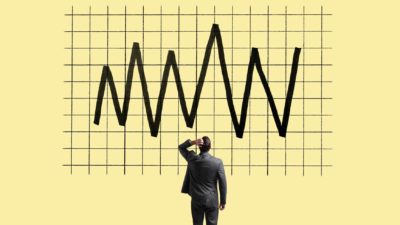And so, here we are again.
The ASX fell 2.2% yesterday, and was off another 2.5% as I type this.
Sub-editors across the country have already penned their headlines, just waiting to put the numbers in the "Another $XX billion wiped off the ASX" placeholder.
(I've seen 'plummet', 'plunge' and 'slump' from major media outlets so far today, and it's not even 11am.)
The usual suspects are bleating about more doom and gloom. The collapse they've been banging on about for 25 years might, finally, be here.
Yeah, right.
Still, here we go again.
I can't tell you how many times I've been through this.
The headlines.
The seemingly sensible 'doom and gloom' scenarios.
The rush to the 'safehaven' of gold.
On and on and on it goes.
If I seem wearied by it, I am. A little, at least.
Not because those fears are unreasonable.
They're not even unwarranted.
But what they're not is useful.
I write about it, though, because it's important to remind our members and readers. Otherwise, it's too easy to fall for the ever-present siren song of negativity.
At this point, I usually tell my story thus:
1. I list the various reasons (wars, pandemics, geopolitical and economic) that people have worried about in years gone by.
2. I then remind my readers that for every 20 or 30 (more?) reasons to be fearful, maybe one actually comes to pass and/or creates any meaningful (though always temporary) share market damage.
3. And then I mention that the market is near an all-time high, demonstrating the folly of trying to avoid potential pitfalls. (More money is likely lost in trying to avoid falls than in the falls themselves!)
4. I throw in a nautical metaphor, which centres on it being more profitable to ride the waves, rather than trying to avoid them.
5. And then I finish on this line:
"In investing, it has always been more profitable to be optimistic and occasionally wrong, rather than pessimistic and occasionally right"
But in more concrete terms? I'm glad you asked.
I'm planning to buy shares tomorrow.
Why tomorrow? Because our trading rules prevent me from doing it today.
(I have to wait two full trading days since last mentioning a company, before I can buy its shares. I then can't mention it publicly for another two full days after buying. And no, don't try to work out which one it is — I can't actually remember if I mentioned the company/ies last week, so I'm waiting until Wednesday out of an abundance of caution!)
Oh, and one reason I may not buy tomorrow is because the company might be this Thursday's Motley Fool Share Advisor recommendation. In which case, I'd have to wait until at least next Tuesday!
Am I planning to buy because this is 'the bottom'?
No.
I have no idea where the bottom is, or will be.
Maybe the market gains 10% in the next three months, or maybe it loses another 20%.
I have no idea. Nor does anyone else.
(You won't hear many people in my industry admit that: when you build your business by allowing people to think you're the font of all that's worth knowing in finance, you can't admit the opposite, can you?)
I can't time the market.
Neither can you.
What I can do, though, is buy when I think a company's shares are inexpensive, relative to the value of all of its future profits.
Here's another spoiler: that's all there is to investing.
I mean, sure; you need to have at least a sense of how to think about value. And you have to be able to assess and understand businesses, to be able to estimate a range of future profit outcomes.
Also, you have to be wrong sometimes. Because that's investing.
After that? You simply buy shares when those two ideas — price and quality — align.
Don't have a view of a company's future? Don't buy.
Don't think you can assess its value? Don't buy.
(Buy a broad index-tracking ETF instead. Actually two: An ASX one and a US/International one.)
Think you can reasonably do both, more often than not? Or have someone you trust to help you do that?
Bingo.
The rest is noise.
Don't believe me?
Let's ask Warren Buffett, who was on CNBC overnight, our time:
"You don't buy or sell your business based on today's headlines. If it gives you a chance to buy something you like and you can buy it even cheaper, you're in good luck… you can't predict the market by reading the daily newspaper."
And yet, today's paper will be full of 'analysis'. Social media will go into overdrive.
Much will be written, said, shouted…
And, to be fair, some of it will be reasonable. If your business goes broke, or its prospects are permanently impaired by Coronavirus, you should pay (much) less for it.
But if this is just transitory?
If sales and profits will return to more or less the same level as before the outbreak?
Well, if you give me a 'panic' price for a quality business whose profits are only temporarily depressed, I'm going to buy.
Aren't you?
Fool on!








